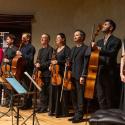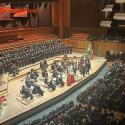
An embarrassment of riches here - it’s hard to know where to start. The opening of Bartók’s Violin Concerto No 2, soft harp arpeggios underneath a pungent, folk-tinged melody, is gorgeous. With luck it will ensnare the open-minded casual listener before the accessibility becomes fused with this composer’s more cerebral mature style. It’s fabulous, spicy stuff – gritty in places but never losing its ability to sing. Only Bartók could make the second subject’s 12-tone row sound so singable. The slow movement’s variations contain some of this composer’s strangest, loveliest music, and the dancing finale ingeniously recycles the first movement’s themes. Patricia Kopatchinskaja’s performance is gutsy, gritty and astringent. This is one of the great violin concertos, and it’s sadly neglected in the concert hall.
As is Ligeti’s 1990 Violin Concerto. There’s much to intrigue in this wondrous piece, notably the eccentric scoring for a 23-piece chamber ensemble. Ligeti uses natural horns, complete with delicious, untuned harmonics, and has percussionists and wind players double up on lotus flutes and ocarinas. The effect is bonkers, but in an incredibly sophisticated, profoundly musical way; Ligeti’s second-movement chorale is one of the most haunting, affecting things you’ll hear. Dive head first into this concerto and love it – it’s a masterpiece from one of the 20th century’s last musical giants. And it is fearlessly played by Kopatchinskaja, who also gives us Seven, composed by the disc’s conductor Peter Eötvös. An offbeat tribute to the seven astronauts who died on board the Columbia space shuttle in 2003, it’s a brilliantly scored yet elusive work.

Jocelyn Pook has been writing music for film and theatre since the late 1990s, achieving fame when her music was used to accompany scenes in Kubrick’s Eyes Wide Shut. Desh was first performed in 2011 and was revived in 2012, Pook’s pre-recorded soundtrack composed to accompany a solo dance piece by the choreographer Akram Khan. Desh is an exploration of identity, of a child born of Bangladeshi parents in the UK rediscovering his roots. Reading reviews of the work’s staging make one bitterly regret not having seen it live. Pook’s music does succeed on its own terms, though you’re continually reminded of the missing visual element. Field recordings made in Dhaka provide the score’s backbone. Vocal solos melt into extended instrumental numbers, and there’s a wonderful layering of mechanical sounds in Metallic Sonata; thumps and crashes taped in a shipyard underscoring car horns, bicycle bells and train noises. All assembled brilliantly, this is music, not noise.
Honey Bee Story’s minimalist harp riff builds up in true Glassian style. You don’t mind the borrowing – instead you’re quietly impressed that so much can be distilled from a sequence of two chords. Pook’s string-saturated, wailing Ave Maria setting leans dangerously close to schmaltz, but it’s irresistible, made perfect by the quality of the vocals swirling around above the orchestral writing. It all works because Pook avoids writing bland, Eastern-sounding pastiche. Her own voice always shines through. Worth investigating even if you haven’t seen Desh in a theatrical setting.

I’ve known several people who claim to enjoy opera “but only the bits when they don’t sing”. With a full-length classical ballet, you don’t have to contend with wobbly vocals. But, too often, the unfortunate punter might be faced with dodgy choreography and a below-par, undersized orchestra struggling to make itself heard. What you really want is a high-quality, uncut recording, in sensational sound, complete with encyclopaedic sleeve notes offering the listener a track-by-track detailed synopsis. This new recording of Tchaikovsky’s The Sleeping Beauty offers just that. Neeme Järvi’s performance is frequently swift – often too fast to be danced too – but so effervescent, so exciting. A colleague warned me about its addictive properties. Me, I was floored several minutes in by the brief Scène Dansante in the ballet’s Prologue; violins divided in six parts introduce the most delectable of waltzes over a brilliantly quirky chord progression. I’d not previously appreciated the originality of this score. Tchaikovsky’s imagination, unconstrained by the need to follow symphonic logic, scoots off in all manner of peculiar, delightful directions.
Making a list of the high spots is impossible; there are too many. Act One’s close, as Aurora descends into sleep, is devastating – I’d recommend pressing the pause button here before moving onto the abrupt mood change at the start of Act Two. Tchaikovsky’s subsequent depiction of the Prince’s kiss with a fortissimo tam-tam crash is a bit crass, but hard to resist. The final act is the flimsiest in terms of plot, but contains several of the most irresistible numbers; the Sapphire Fairy’s loopy 5/4 trot, or the feline mewings heard on cor anglais shortly afterwards. I was teary-eyed at the ballet’s close. James Ehnes and Robert deMaine have been parachuted in to play the big violin and cello solos. It’s all stunning – possibly one of the greatest ballet recordings ever made, and superbly annotated by theartsdesk's David Nice. Unmissable.














Add comment